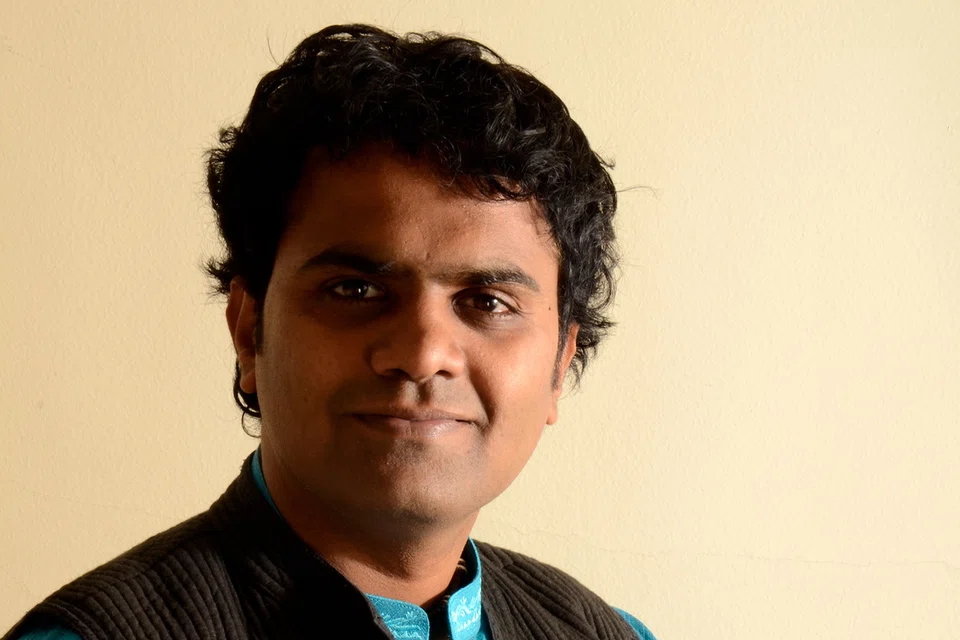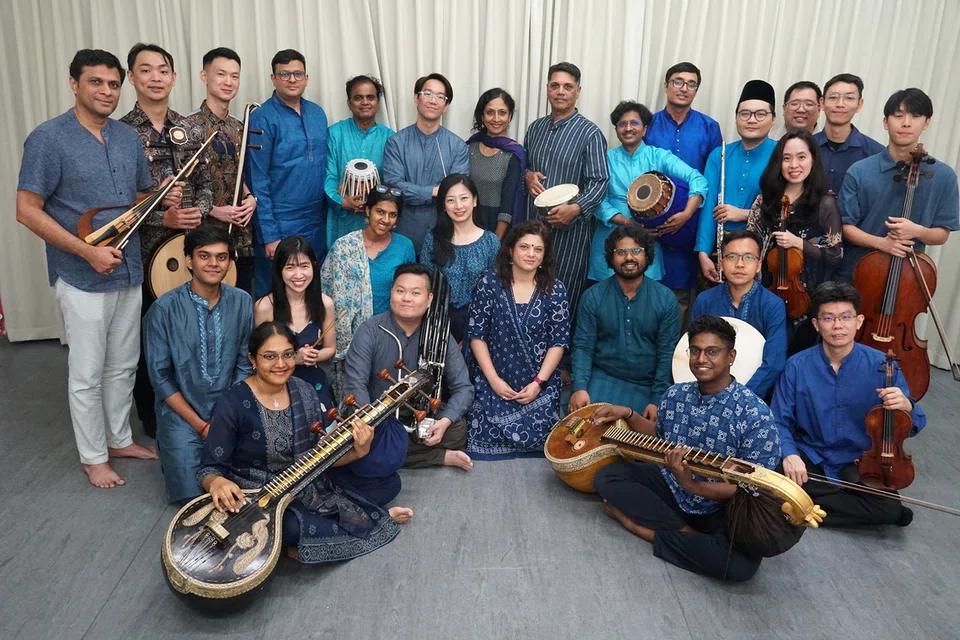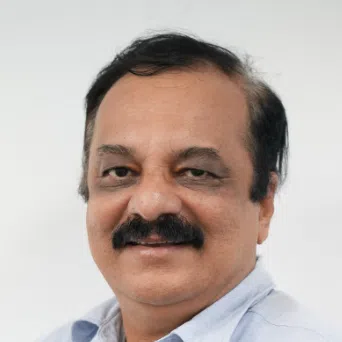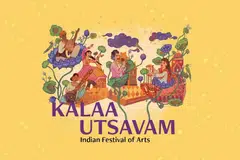When the opening notes of Samudra – An Ocean of Musical Traditions fill the Esplanade Concert Hall on Nov 21 evening, they will carry more than melody.
Conceived by tabla maestro Nawaz Mirajkar and performed by SwaRhythm Singapore, this grand 90-minute production is both a celebration of the ensemble’s 10th anniversary and a musical tribute to Singapore’s SG60 milestone.
Presented as the opening performance of Esplanade’s Kalaa Utsavam 2025, Samudra brings together 32 musicians from Indian, Chinese, and Malay traditions under the baton of conductor Dedric Wong.
It is a bold, multi-ethnic orchestral concert that celebrates Singapore’s identity as an island of confluence – where cultures meet and flow together like rivers merging into the sea.
The Sanskrit word samudra – meaning ocean – captures the concert’s essence: an expansive, fluid space where diverse musical traditions interact, converse, and evolve.
“For me, water is a metaphor for life,” Nawaz told tabla!. “It moves, listens, and connects. In Samudra, water becomes the thread linking cultures, emotions, and histories. Just as water knows no boundaries, neither does music.”
The concert features four new compositions inspired by the theme of water as a source of connection:
• Gu Wei’s “Sky, Silk and Sea” traces the journey of a river along the Silk Road, symbolizing cultural exchange.
• Syafiqah ’Adha Sallehin’s “Bisikan Samudera” (Whispers of the Ocean) pays homage to the Orang Laut, the seafaring communities of the Malay Archipelago.
• Avik Chari’s “Jal Katha” (Water Stories) captures the rhythmic vitality of South and Southeast Asian folk traditions within contemporary soundscapes.

• “Confluence” by Nawaz and Renu Suresh serves as the finale – an uplifting synthesis of all traditions, where melodies and rhythms merge into one oceanic flow.
While multicultural performances are familiar to Singapore audiences, Nawaz stresses that Samudra goes beyond fusion.
“This isn’t about blending genres superficially. It’s about conversation – about letting each musical tradition breathe, listen, and respond,” he said. “When a Chinese erhu sings beside an Indian veena, or Malay rhythms echo with tabla and gongs, it’s a dialogue built on empathy and respect.”
The concert features a remarkable ensemble: 35 performers, including SwaRhythm’s seven core musicians, traditional Chinese and Malay instrumentalists, Western classical players, and vocalists.
Among them are Renu (piano), Anand Viswanathan (Indian violin), Kumar Karthigesu (sitar), Uma Gowri Ramanathan (veena), Sunil Avachat (bansuri), Mahesh Parameshwaran (percussion), and singers Sveta Hattangdi Kilpady and Sandhya Ramachandran – each contributing to what Nawaz calls “an ocean of timbre where no sound dominates, only flows.”
Adding a striking visual dimension is a live sand art performance, with an artist creating fluid images of rivers, waves, and journeys in sync with the music.
“It’s like watching memory being drawn in sand – momentary, fragile, and alive,” said Nawaz. “The visuals mirror the sound, turning each composition into living poetry.”
In another innovation, Samudra features a water percussion segment by Foo Sek Sheng, where actual water is used to produce rhythmic splashes, drips, and resonant tones.
“The water percussion symbolises nature’s rhythm and connects perfectly to Samudra’s theme,” said Nawaz.
Helming the performance is Dedric Wong, resident conductor of the Ding Yi Music Company, whose artistry ensures balance between the traditions.
“Dedric has rare sensitivity,” Nawaz noted. “He understands nuance and the unspoken language of collaboration. Under his baton, the musicians don’t just follow – they breathe together. He becomes the tide, keeping all our musical rivers moving as one.”
Samudra is as much a personal milestone for SwaRhythm as it is a national one. Founded in 2015, SwaRhythm Singapore has grown into one of the nation’s leading Indian classical ensembles, supported by the National Arts Council.
Over the past decade, it has become a vital voice in Singapore’s multicultural arts scene – collaborating across genres, mentoring young artists, and expanding the language of rhythm.
In Samudra, that legacy flows forward. The concert’s theme of water mirrors Singapore’s own story: a maritime nation shaped by the meeting of cultures, constantly renewing itself through exchange.
“Historically, music and culture travelled across the seas, linking India, China, and Southeast Asia,” said Nawaz. “I wanted Samudra to capture that same journey – the ebb and flow of cultural exchange through sound.”
With its blend of ancient instruments, modern orchestration, live visuals, and immersive sound, Samudra – An Ocean of Musical Traditions invites audiences into a space where music becomes water – fluid, borderless, and life-giving.
As the waves of sound rise and recede inside the Esplanade Concert Hall, Samudra will remind audiences of the essence of Singapore’s artistic identity: unity through diversity, tradition meeting innovation, and a shared journey towards harmony.
In the words of Renu, co-composer of Confluence: “Like the ocean, Samudra embraces everything it touches.”



